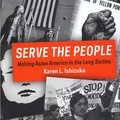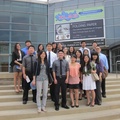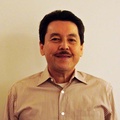On a summer evening in Los Angeles’ Little Tokyo, the yelling and antics of 27-year-old Craig Ishii and 24-year-old Kristin Fukushima fill the courtyard of the Japanese American Cultural and Community Center. For what it’s worth, their silliness has a purpose. They are tasked with breaking the icy awkwardness that has settled upon nearly 70 high school students from throughout Southern California. Fortunately, though, Craig and Kristin have done this before. By the end of the half-hour-long icebreaker session, names have been exchanged and some awkwardness dispelled.
The program is Youth CAN (short for Youth Community Action Network)—a ten-week summer program aimed at sharing community involvement, cultural awareness, and leadership development with high school students—and it is the flagship program of Kizuna (Japanese for “bond”), a nascent nonprofit geared toward building a vibrant community in Little Tokyo from the youth up.
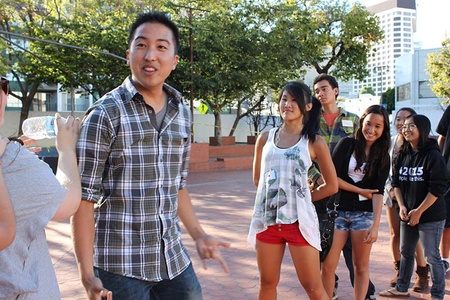
Craig Ishii, executive director, and Kristin Fukushima, vice-chair of Kizuna's board of directors, lead an icebreaker activity in the courtyard of the Japanese American Cultural and Community Center. (Photo courtesy of Lucy Truong)
Youth CAN: A Brief Overview
At its core, the Youth CAN program seeks to “really build a passion for community work,” according to Ishii, executive director of Kizuna. There are three tracks, each designed for a particular purpose and level of experience among the participants. Track 1 is designed for students new to the program, and it introduces the concepts of cultural identity and community. In a few of the Track 1 sessions, students focus on the importance of Little Tokyo as a nexus for defining and articulating Japanese American identity in Southern California. More importantly, facilitators encourage students to try to make sense of what their individual roles in defining Japanese American culture and community might be.
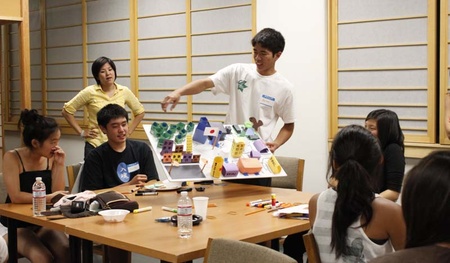
Youth CAN Track 1 students discuss their ideal community during the "Japanese American Community-Topia" workshop. (Photo courtesy of Lucy Truong)
Track 2 is designed for returning high school students, and it focuses on planning and carrying out community service projects that are predicated on collaboration, teamwork, and positive community action. Track 3 is a new addition, and it is designed for college students who have gone through the other tracks. Its purpose is to build the skills of college students so that they are able to work well with other “community-minded” people—for example, so that they can more effectively navigate the world of college campus student organizations.
A Growing Success Story
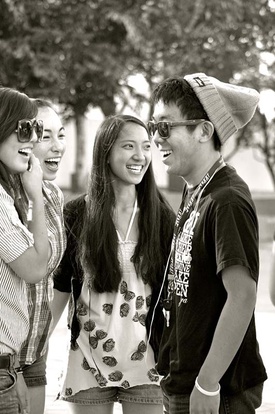
Elena Inamine, far left, and Scott Shima, far right, enjoy a summer evening (circa 2011) with their fellow Youth CAN comrades. (Photo courtesy of Kizuna)
Kizuna, which celebrated its one-year anniversary in April, is steadily and surely making Little Tokyo into a more meaningful place for high school and college youth. Elena Inamine and Scott Shima, both rising college sophomores and seasoned veterans of the youth program, are literally the poster children of Kizuna’s Youth CAN program. Photos of their younger selves pepper Kizuna’s promotional brochures—and not without reason. Both Inamine and Shima have found the time to remain actively involved in the Japanese American community in Little Tokyo in various capacities.
Inamine, a 19-year-old sophomore at the University of Southern California, has been participating in the youth engagement program for four years and counting (though Kizuna is officially in its second year, the Youth CAN program has existed in various guises for five years, according to Ishii). Inamine currently participates in Track 3 of the Youth CAN program, the component of the program that attempts to provide college students with peer management skills. Through the Nikkei Community Internship program, which offers college-age youth the opportunity to work with organizations based in and around Little Tokyo, Inamine is also interning this summer at the J. Morey Company, an independent, family-owned insurance agency with deep roots in Little Tokyo history.
“One of the primary reasons that I came back to Little Tokyo and remained involved [in the program] was seeing people like Craig and Kristin and Stacy,” Inamine said, citing the contagious energy and passion of the young adults who came together to start Kizuna. “Watching these people—who aren’t that much older than us—dedicate themselves to building community here in Little Tokyo is really inspiring, and it’s what keeps me coming back to Little Tokyo.”
Shima has found himself coming back, too. After completing Track 2 of Kizuna’s Youth CAN program, the 19-year-old went on to successfully revive the Nikkei Student Union on campus in his first year at the University of California, Riverside. Like Inamine, Shima has opted to stay involved in Little Tokyo this summer through the Nikkei Community Internship program. He interns at the Japanese American Cultural and Community Center this summer, and he currently participates in Track 3 of the Youth CAN program as well.
“I think it’s very important to have strong role models in the community,” Shima said, echoing Inamine’s sentiments. Shima explained that it was because several young role models inspired him that he was able to develop new friendships and stronger ties to the Japanese American community in Little Tokyo. Furthermore, for Shima, the personal meanings that have emerged in Little Tokyo have transformed it into a personally significant place that carries valuable histories and memories.
Inamine and Shima represent the limitless capacity for good that can come of Kizuna’s community engagement programs. Kizuna’s Youth CAN program has already developed young and emerging leaders who are beginning to demonstrate their ability and willingness to contribute to the Little Tokyo community.
“Seeing our students do things—do big things—on campus is wonderful,” Fukushima said. “It’s very rewarding to see that passion build in these students to the point where they want to come back. It gives [us] hope for both what [we’re] doing and the future of the community.”
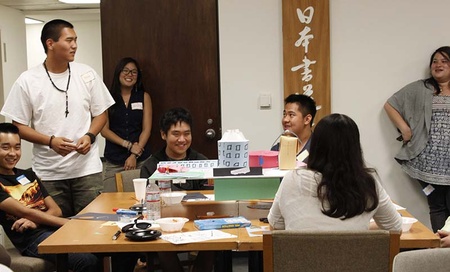
Another group of Youth CAN Track 1 students share the details of their ideal community, which features a central community center, sustainable public transportation, and affordable housing. (Photo courtesy of Lucy Truong)
Of the Community, By the Community, For the Community
The co-founders—Fukushima, Stacy Toyota, and Sen Sugano—came together in 2011 and formed Kizuna after moving on from their jobs at the Pacific Southwest District of the Japanese American Citizens League. It all came together when Nikkei for Civil Rights and Redress (NCRR) agreed to fiscally sponsor the emerging organization, according to Kizuna’s website.
In every sense of the word, Kizuna is truly a product of community support. The organization’s current office in the Japanese American Cultural and Community Center contains furniture donated by the Little Tokyo Service Center, computers provided by SoCal Edison, and a bookshelf that Fukushima brought in to spruce the place up. Even the office space itself was a product of negotiation and goodwill; Kizuna staffers volunteer their time and services to help JACCC in various capacities, in exchange for the use of their office space.
“Everyone was just so supportive and welcoming. We felt very loved and supported by people that we really respected and looked up to in the community,” Fukushima said, remembering not only all the encouragement provided by Little Tokyo community leaders but also the excitement of starting a new organization. “I still can’t believe we did it.”
For more information, check out the Kizuna website at www.kizuna-la.org.
*This is one of the projects completed by The Nikkei Community Internship (NCI) Program intern each summer, which the Japanese American Bar Association and the Japanese American National Museum have co-hosted.
© 2012 Lawrence Lan


